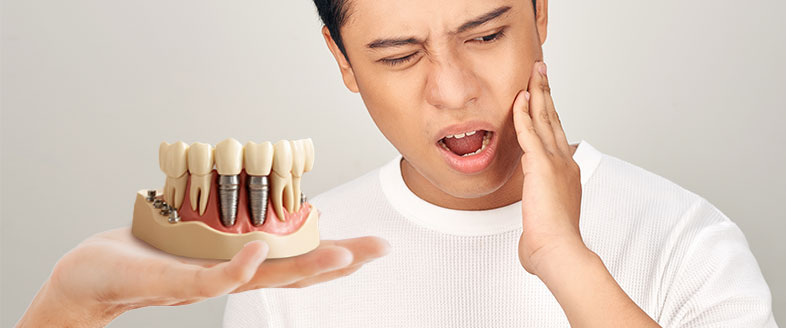Dental implants are a replacement option for missing teeth, and can improve function as well as aesthetics if planned and maintained well.
In this article, we will discuss the pros and cons of dental implants, and the aftercare procedure you should take note of to reap maximum benefits from dental implant treatment.
Key Takeaways
Side Effects & Complications of Dental Implants
Dental implants have a high success rate, but as with any surgical procedure, there are potential complications to be aware of. Here are some potential risks you should be mindful of when considering dental implants:
1. Pain and Bleeding
Most of our patients note very minimal discomfort, as long as post-operative instructions and medications are taken/followed as advised. Most of the time, there is minimal bleeding as well.
2. Infection
Infection may occur around the implant site, especially with poor oral hygiene or if there are any unreported medical conditions. Signs of infection include swelling, pain, redness, and pus discharge.
It is important to accurately report your medical history to your dental surgeon in order for appropriate and suitable treatment planning.
3. Loose Implants and Dental Implant Failure
While uncommon, dental implant failure can occur if an implant does not properly integrate with the surrounding bone (osseointegration). Poor bone quality, smoking, uncontrolled diabetes or autoimmune diseases are some factors that may increase the risk of dental implant complications or failure. This is once again why accurate reporting of medical and smoking history to your dental practitioner is of paramount importance.
5. Nerve and Tissue Damage
The risk of nerve or tissue damage may occur during implant placement, especially in the lower jaw where nerves are close to the implant site. This can cause numbness, tingling, or altered sensation in the lips, tongue or even chin. In most cases, nerve damage is temporary but may occasionally be permanent.
In order to reduce the risk of nerve and tissue damage, we always take a 3D radiograph of the region during the treatment planning process to advise our patient of their suitability for implant therapy.
6. Gum Disease (Peri-implantitis)
Peri-implantitis is an inflammatory condition that affects the bone and gum surrounding dental implants. This can potentially lead to implant failure if left untreated. Long-term good oral hygiene practices and regular professional maintenance appointments are essential for preventing peri-implantitis.
Aftercare for Dental Implants

Proper care after dental implant procedure is crucial for ensuring the success and longevity of dental implants. Here are some essential tips to follow after a dental implant surgery:
1. Eat Soft Foods
Stick to a soft diet and eat on the non-treated side of the mouth for the first few days after surgery to minimise discomfort and to avoid disrupting the bone growth healing process. Eating a cool, liquid-based diet in the first 24 to 48 hours after the surgery is crucial for optimal recovery.
Opt for foods that are easy to chew and swallow, such as mashed potatoes, smoothies, and soups. You should also stay away from hot liquids. They can irritate the gum tissue and complicate the healing process.
2. Take Prescribed Pain Medications or Antibiotics
Follow the post-operative instructions that your dentist tailored for you. These instructions may include guidelines for oral hygiene, diet, pain medication usage, and activity restrictions. Take any prescribed pain medications because they can help to manage post-surgery discomfort and bleeding.
In some cases, applying ice packs to your upper jaw and near the surgical area can also help reduce swelling and alleviate pain during the first 24 to 48 hours.
3. Practise Proper Oral Hygiene
Observing proper oral hygiene is the key to preventing infection and promoting healing around the implant area. Brush your teeth gently using a soft-bristled toothbrush and fluoride toothpaste, and be extra careful not to traumatise the surgical area.
Avoid smoking for a minimum of two weeks and use an antimicrobial mouthwash as recommended by your dentist to reduce bacterial plaque. Always seek the advice of a dental specialist or your dentist for a proper cleaning method that will not disrupt proper osseointegration.
4. See Your Dentist
Don't forget! After your surgery, it's crucial to attend all follow-up appointments with your dentist to track your healing progress and ensure a smooth recovery. This can help to ensure that the implants are integrating properly with the surrounding bone and prevent infection or complications.
5. Don’t Chew Hard Items
Avoid hard or crunchy items like nuts, ice or hard candy because they may damage your implant and disturb the healing process.
Get Professional Dental Advice On Dental Implants Today

While it's important to be aware of the potential dental implant side effects, it is good to note that the benefits of such surgery often outweigh possible complications. Dental implants can be a long-term solution for tooth loss. They look, feel, and function very similarly to natural teeth and enable improved speech and comfortable chewing. However, as with any dental procedure, suitability for such treatment can be better assessed after a complete dental examination. If you wish to learn more about dental implants and how these can help you look and feel better, reach out to any of our dentists at dePacific. We use a gentle and caring approach for all of our treatments to ensure the best for your oral health.
To find out more, make an appointment with our dental professionals today.

